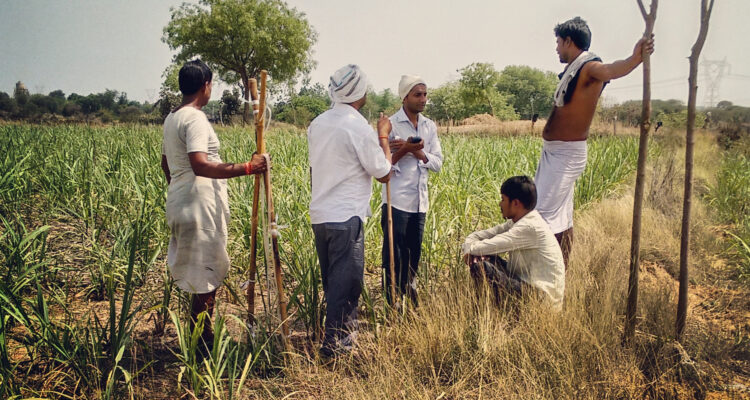The ‘Four Principles of Organic Agriculture’ were established by IFOAM, the global apex body of organic farming, as ethical and concomitant guidelines to be followed in organic farming.
◊ By Neelesh Gharmalkar
Note: To find organic products and organic ingredient suppliers in India, buy the Organic Directory
The substantial growth in the organic sector represents both vast opportunities and challenges. Captains of the organic movement worldwide felt the need to blueprint the principles that basic organic agriculture rests on. Subsequently, the General Assembly of IFOAM (International Federation of Organic Agriculture Movements), the global apex body of organic farming, passed the ‘Four Principles of Organic Agriculture’ on September 25, 2005.
The quartet of principles encompasses health, respect for ecology, and fairness for all living beings. Penned as concomitant ethical guidelines to inspire further growth in organic agriculture, they chart possibilities in positions, programmes and standards for global organic farming.
1 THE PRINCIPLE OF HEALTH
“Organic agriculture should sustain and enhance the health of soil, plant, animal, human and planet as one and indivisible.”
As per this principle, the health of individuals and communities is deeply connected with that of the ecosystem. Healthy soil equals healthy crops, equals healthy people. Health is not merely the absence of illness but also the conservation of physical, mental, social and ecological wellbeing. Immunity, resilience and regeneration are the main attributes of health.
Whether in farming, processing, distribution, or consumption, organic agriculture aims to uphold and improve the health of ecosystems and organisms, from the most diminutive creature in the soil to us human beings. It intends to produce high quality, nutritious food that adds to preventive healthcare and wellbeing. Fertilisers, pesticides, animal drugs and food
2 THE PRINCIPLE OF ECOLOGY
“Organic agriculture should be based on living ecological systems and cycles, work with them, emulate them and help sustain them.”
The ecology of each production environment provides nourishment and wellbeing. For example, for crops—the living soil provides nourishment; for animals—the farm’s ecosystem supports them; for marine organisms—the aquatic environment feeds them. Organic farming, pastoral or wild, must merge with the cycles of nature. These universal cycles have site-specific operations. Organic practices have to embrace local ecological conditions, culture and scale.
Reusing, recycling and efficient management of materials and energy maintains and improves environmental quality and conserves resources. Ecological balance has to be achieved through the design of farming systems, establishment of habitats and maintenance of genetic and agricultural diversity. Producers, processors, traders and consumers of organic products must protect and benefit the shared environment, including landscapes, climate, habitats, biodiversity, air and water.
3 THE PRINCIPLE OF FAIRNESS
“Organic agriculture should build on relationships that ensure fairness with regard to the common environment and life opportunities.”
Fairness stands for equity, respect, justice and stewardship of the shared world—amongst humans and with other living beings. Those engaged in organic agriculture have to conduct human relationships in a manner that ensures fairness at all levels to all parties, be it farmers, workers, processors, distributors, traders or consumers. Organic agriculture aims to provide all involved with robust life, contribute to food sovereignty and limit poverty. According to the Fairness Principle, animals, too, should be offered life conditions and sustenance in harmony with their physiology, nature and wellbeing.
Natural and environmental resources employed for production and consumption have to be utilised in a socially and ecologically just manner, so as to become a legacy for future generations. Fair systems of production, distribution and trade should be open and equitable and account for environmental and social costs.
4 THE PRINCIPLE OF CARE
“Organic agriculture should be managed in a precautionary and responsible manner to protect the health and wellbeing of current and future generations and the environment.”
The Care Principle dictates organic agriculture is a living, breathing, growing system, and continually responding to internal and external changes. It should be used to boost efficiency and productivity but never by endangering crop and consumer health. New technologies must be reviewed and existing methods assessed regularly, since our understanding of our ecosystem is still evolving.
Precaution and responsibility are vital in managerial, developmental and technological decisions in organic agriculture. Science is crucial for ensuring healthy, safe and ecologically sound farming. But scientific knowledge alone will not suffice. Practical experience, accumulative wisdom and indigenous knowledge are time-tested guides. Choices must reflect the values and needs of all parties affected through transparent and participatory processes.
The author has been studying the evolution of the organic movement in India for 20 years and is Co-Founder of Krishi Katta



Leave a Reply